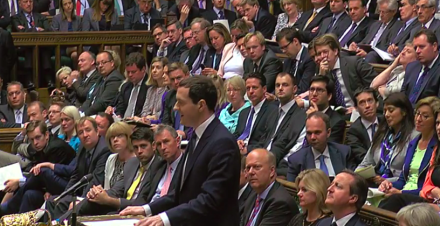
Labour strongly believes that the Tory governments of recent parliaments have been bad for the economy. Taking the most recent period, George Osborne has talked of a “long-term plan for the economy”. In practise he has simply been reacting to a sequence of bad sets of numbers. Under Osborne’s chancellorship, the economy can be characterised as low growth, low investment, high overseas deficit, low productivity and long term continuing austerity. Politicians may argue about whether the current poor economic outlook is due to uncertainty caused by the upcoming referendum, but the data and the balance of economic opinion suggests growth would be slowing even without that as a factor.
Before the last election, we were promised 2.4 per cent GDP growth this year. Three months later this was revised down to 2.1 per cent and now we are looking at around 1.9 per cent with the year only halfway done, and whatever the outcome of the referendum. Certainly Labour must be critical of the overoptimistic forecasts produced before the last election, and the continued inaction by the Government in face of the very obvious economic imbalances facing us.
Most worrying is the Tory focus on the Government deficit resulting in lack of investment in our economy and a drastic reduction in funds available for local authorities and regional development.
Their focus should instead be on the huge deficit on the balance of payments. As the media are only now beginning to point out, this is the main imbalance in the economy and has been for the past five years. We have been borrowing from abroad huge sums of money – to the extent now of 6 to 7 per cent of GDP. It is this imbalance which will hit our future generations, who will no longer benefit from Britain’s investment overseas but will have to pay back interest and dividends on the huge sums the country is now borrowing. That is certainly not the way Labour would want to run our economy.
This imbalance leads to some very strange investment decisions. It seems unimaginable that a Labour government would countenance having a project such as the Hinckley Point C power station financed by French and Chinese interests, and paid back by charging consumers exceptionally high prices for the energy produced. That approach simply puts up the cost of power generated so that future generations must pay for the necessary electricity and recompense foreign investors for their risk – perpetuating the sort of policies that have put our entire steel industry in jeopardy.
Hinckley is just one example of a major infrastructure requirement this Government is buying from overseas, but there are many more examples with huge infrastructure sectors now owned overseas; airports, seaports, water and electric utilities, much of our public transport as well as banks and swathes of the manufacturing industry. This is the consequence of our balance of payments deficit and results in a much greater loss of control over our economy even than Brexit.
So where are the other areas of economic policy which are being mismanaged? There are plenty of examples of the Tories driving forward to open up our markets to foreign competition. This results in a playing field which is tilted against us and results in foreign competitors winning business or taking over whole sectors to the detriment of the British economy. Steel is one example, with the high exchange rate and high energy costs resulting in our current situation but there are many more.
Even in further education a lack of investment and some rather foolish funding policies are forcing universities to cut quality and over the next years must risk losing out to overseas institutions which receive more practical encouragement from their domestic governments.
Another obvious area of concern for any “long-term plan” is productivity. In this area foreign competitors are achieving far greater output per worker than the UK. As an example, in Norway, productivity per worker is about 50 per cent more than in the UK. Part of the reason is certainly investment. The Tory Government seems content to drive a low investment, high consumption economy – that is not the case in northern Europe where economic policy drives forward major investment both public and private.
But there are other causes which the Government has failed to address, such as the emphasis on short-term results, the lack of a regional policy, with London sucking critical resources and entrepreneurial skills away from the rest of Britain, poor education policy and poor support to maintain and develop a trained and skilled workforce.
Taking a long hard look at the results and the impoverishing policies of Tory rule, it is hard to see how anybody can honestly believe their approach has been “good for the economy” – certainly not for foreign trade, investment, productivity or even for the Government’s continued high deficit.
David Leslie is a former Treasury economist who has also worked in Germany and France.




More from LabourList
‘SEND reforms are a crucial test of the opportunity mission’
Delivering in Government: your weekly round up of good news Labour stories
Labour place third in Gorton and Denton by-election as Greens gain seat